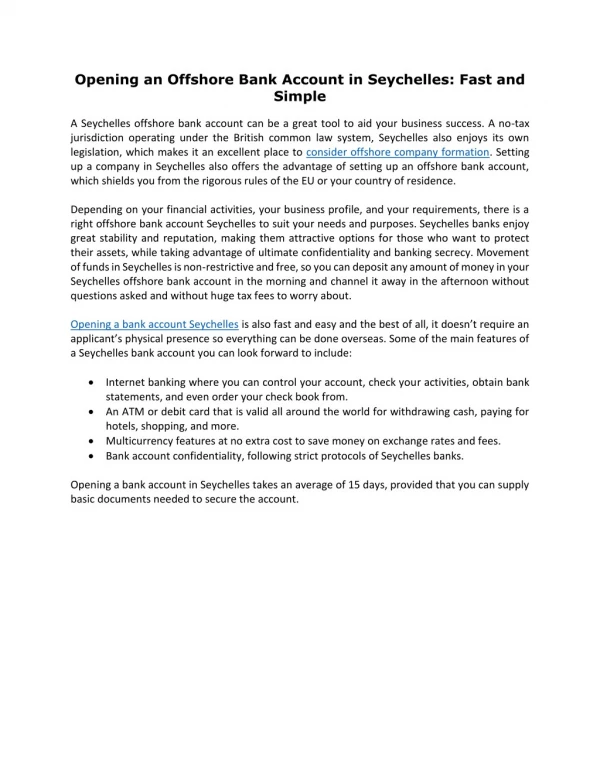How Offshore Company Formations Aid Estate and Financial Structuring
How Offshore Company Formations Work: A Detailed Introduction for Entrepreneurs
Offshore firm formations can supply considerable advantages for business owners seeking tax obligation optimization and possession protection. The procedure includes numerous crucial steps, starting with careful territory option and complete documentation prep work. Involving professional solutions is essential for conformity. Nonetheless, lots of ignore the ongoing responsibilities that follow first enrollment. Understanding these complexities can make a significant difference in leveraging offshore opportunities successfully. The following actions are necessary for long-term success.
Recognizing Offshore Companies: What They Are and Why They Matter
The principle of overseas firms might appear complex, understanding their essential nature and relevance is crucial for both individuals and companies looking for to maximize their monetary methods. Offshore firms are entities signed up outside the person's country of house, commonly in territories that use positive regulative settings. These companies can offer different benefits, such as tax obligation optimization, possession security, and enhanced personal privacy.
For business owners, developing an overseas business can help with worldwide trade, decrease operational prices, and increase market reach. Additionally, offshore firms frequently enable streamlined conformity with global laws. People may also use overseas structures to protect personal assets from economic or political instability in their home nations. Inevitably, the allure of overseas companies hinges on their capacity to improve financial adaptability and supply calculated advantages in a significantly interconnected international economic situation - Offshore Company Formations. Understanding their functional structure and benefits is vital for making educated decisions
Picking the Right Jurisdiction for Your Offshore Firm
Selecting the ideal jurisdiction for an overseas company is critical for making the most of tax obligation benefits and making certain compliance with regional laws. Different territories offer differing tax obligation rewards and regulative environments that can substantially affect business operations. Subsequently, a careful evaluation of these aspects is vital for educated decision-making.
Tax Benefits Introduction
When taking into consideration the establishment of an offshore business, recognizing the tax advantages related to different jurisdictions is necessary. Various locations provide special benefits, such as reduced or no company tax obligation prices, which can substantially boost profitability. Some jurisdictions provide tax incentives for specific sorts of organizations, bring in business owners looking for minimized tax obligation obligations. Furthermore, certain countries enforce favorable tax obligation treaties that minimize dual taxes on global earnings, making sure that services keep more revenues. The option of jurisdiction also influences value-added tax obligation (VAT) and various other regional taxes. Business owners need to examine these elements carefully to pick an area that straightens with their business goals, maximizing tax performance while remaining certified with global regulations.
Regulatory Atmosphere Considerations
Choosing the ideal jurisdiction for an overseas company calls for a comprehensive understanding of the governing atmosphere, as various countries enforce differing levels of conformity and governance. Business owners must examine factors such as legal structures, tax guidelines, and reporting obligations. Territories like the British Virgin Islands and Cayman Islands are typically preferred for their business-friendly laws and very little coverage requirements. On the other hand, some nations may impose rigorous policies that can complicate procedures and increase expenses. Additionally, the political stability and credibility of a territory can affect the long-lasting stability of the offshore company. Cautious factor to consider of these governing facets is crucial to ensure that the picked territory straightens with the business's operational needs and tactical goals.
Preparing the Required Documentation
Preparing the required paperwork is a necessary action in the overseas business formation procedure. Business owners should collect numerous legal and recognition files to facilitate their firm's facility in a foreign jurisdiction. Generally, this consists of a comprehensive company plan laying out the business's objectives and functional methods. Additionally, individual recognition files, such as keys or motorist's licenses, are required from the firm's shareholders and supervisors.
In most cases, evidence of address, like utility costs or bank declarations, is needed to verify the identifications of the included events. In addition, certain forms dictated by the territory, including application for registration, have to be completed properly. Some jurisdictions might likewise call for a declaration of the nature of organization activities and compliance with neighborhood policies. Extensively preparing these documents ensures a smoother enrollment process and aids reduce prospective hold-ups or issues, inevitably establishing a solid structure for the offshore entity.
Engaging Specialist Services for Offshore Formation
Involving expert solutions in offshore formation can significantly enhance the efficiency and performance of the process. Business owners usually deal with complexities that can be frustrating, making expert advice important. Professional firms concentrating on offshore formations provide a wide range of understanding regarding jurisdiction choice, business structure, and neighborhood market conditions.
These professionals can aid in drafting necessary documentation, guaranteeing accuracy and conformity with details requirements. They additionally help enhance communication with local authorities, lowering the likelihood of misunderstandings or delays. Furthermore, specialist services can offer insights right into calculated advantages, such as tax advantages and possession security, customized to the business owner's particular requirements.
Navigating Regulatory Compliance and Legal Needs
Comprehending the regulative landscape is vital for business owners beginning on overseas firm developments. Compliance with regional laws and international regulations is essential to stay clear of this hyperlink legal risks. Each territory has details needs concerning firm registration, reporting, and tax, which must be thoroughly researched.
Entrepreneurs need to acquaint themselves with the guidelines controling company structure, ownership, and functional methods in the selected offshore location. Furthermore, anti-money laundering (AML) and know your customer (KYC) policies typically use, needing proper paperwork and verification processes.
Involving with legal experts that specialize in offshore services can offer vital guidance on steering with these complexities. Ensuring compliance not only shields the company from possible lawful concerns but also boosts credibility with regulatory authorities, companions, and investors. By sticking to the prescribed lawful structures, entrepreneurs can effectively leverage the advantages of overseas firm formations while reducing risks connected with non-compliance.
Establishing Financial and Financial Accounts

When an appropriate bank is determined, entrepreneurs typically require to prepare and send numerous documents, including proof of identification, company enrollment files, and a description of the designated organization activities. (Offshore Company Formations)
Some financial institutions might likewise need a minimum down payment to open up an account. Entrepreneurs ought to be prepared to answer questions pertaining to the source of funds and business operations. By thoroughly understanding the financial landscape and abiding by the financial institution's requirements, entrepreneurs can protect their overseas firm has seamless accessibility to important economic services for effective operation.
Maintaining Your Offshore Business: Recurring Responsibilities and Ideal Practices
Maintaining an overseas business involves numerous recurring duties that are vital for link compliance and functional integrity. Trick elements include sticking to yearly conformity requirements, keeping precise monetary records, and recognizing tax obligation commitments. These elements are vital for making certain the company's durability and legal standing in its territory.
Yearly Compliance Needs
While developing an offshore firm provides numerous benefits, it additionally requires ongoing duties that can not be forgotten. Annual conformity demands differ by territory but generally consist of submitting yearly returns and financial declarations to neighborhood authorities. Firms must additionally pay yearly fees, which can consist of registration revivals and taxes, depending upon the place. Furthermore, numerous territories need keeping a registered office and a local representative. Failing to adhere to these guidelines can cause charges, consisting of fines or also dissolution of the company. Business owners must likewise recognize any type of changes in local laws that may affect their compliance responsibilities. Remaining educated and organized is important for maintaining the benefits of an offshore firm while satisfying legal responsibilities effectively.
Maintaining Financial Records
Compliance with annual demands is only component of the recurring duties connected with overseas firm administration. Preserving exact financial documents is vital for assuring transparency and responsibility. Entrepreneurs have to methodically document all deals, consisting of income, expenses, and assets. This technique not just aids in interior decision-making but additionally prepares the company for prospective audits from regulative authorities.
Routinely upgrading financial statements, such as earnings and loss accounts and equilibrium sheets, is essential for tracking the business's monetary health. Making use of bookkeeping software application can streamline this process, making it simpler to maintain and produce records compliance. On top of that, entrepreneurs must consider seeking specialist accounting services to ensure adherence to neighborhood policies and best methods, thereby guarding the integrity and reputation of their overseas operations.

Tax Obligation Obligations Summary
Guiding through the complexities of tax obligations is essential for the effective administration of an overseas company. Entrepreneurs should recognize the tax obligation regulations of both their home nation and the jurisdiction where the overseas entity is developed. Conformity with regional taxation regulations is vital, as failing to adhere can lead to penalties or legal concerns. Regularly filing essential tax obligation returns, even when no tax might be owed, is frequently required. Additionally, preserving precise and current monetary records is imperative for demonstrating compliance. Looking for advice from tax obligation experts aware of international tax legislation can aid navigate these commitments effectively. By carrying out ideal techniques, business owners can guarantee that their offshore operations remain economically viable and lawfully certified.

Often Asked Inquiries
Exactly how Long Does the Offshore Company Development Process Generally Take?
The offshore business formation process generally varies from a few days to several weeks. Aspects influencing the timeline consist of jurisdiction, documents requirements, and responsiveness of lawful and economic establishments associated with the arrangement.
What Are the Costs Related To Maintaining an Offshore Company?
The prices related to maintaining an overseas business can differ commonly. They generally consist of annual enrollment fees, compliance costs, accounting services, and possible legal fees, relying on the jurisdiction and details service tasks entailed.
Can I Open Up a Personal Checking Account for My Offshore Business?
Opening a personal checking account for an offshore company is usually not permitted. Offshore accounts must be service accounts, reflecting the business's linked here tasks, therefore abiding by regulations and making sure proper economic management and legal responsibility.
Are There Limitations on Foreign Possession of Offshore Business?

What Occurs if I Fail to Abide By Offshore Regulations?
Failure to adhere to offshore policies can cause severe penalties, consisting of substantial fines, loss of company licenses, and potential criminal costs. In addition, non-compliance might cause reputational damages and troubles in future service operations.
Offshore firms are entities registered outside the individual's nation of residence, commonly in jurisdictions that provide favorable governing environments. Picking the ideal jurisdiction for an overseas firm is critical for making the most of tax obligation benefits and ensuring conformity with local policies. When considering the establishment of an overseas business, comprehending the tax benefits linked with numerous jurisdictions is essential. Choosing the appropriate jurisdiction for an overseas business calls for a complete understanding of the regulatory atmosphere, as different nations impose differing levels of compliance and governance. Additionally, the political stability and credibility of a territory can influence the long-term stability of the overseas business.